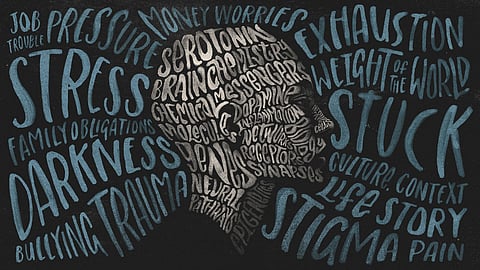

A complicated mental illness that affects millions of individuals globally is depression. It extends beyond fleeting depressive states and can significantly affect a person's everyday activities, interpersonal connections, and general well-being. The goal of this page is to give a thorough overview of depression, covering its causes, signs, and management techniques.
Depression's causes
Biological Factors: Depression is significantly influenced by genetic predisposition. People who have a family history of depression may be more prone to the illness. Serotonin and dopamine imbalances are two examples of neurotransmitter imbalances that may be linked to depression symptoms.
Environmental Factors: Depression can be brought on by traumatic life experiences, like the death of a loved one, abuse, or major life changes. Prolonged stress may raise the chance of getting depression, particularly if it is not adequately controlled.
Psychological Factors: Depression can be triggered by personality features such as excessive self-criticism or low self-esteem. An individual's susceptibility to depression may vary depending on their coping strategies and stress management skills.
Depression Signs and Symptoms
Emotional symptoms include: increased impatience or frustration over trivial issues; loss of interest in or enjoyment from previously appreciated activities; and persistent sorrow or a sense of emptiness.
Cognitive symptoms include negative ideas about oneself, the world, and the future, as well as difficulty focusing, making decisions, or remembering specifics.
Physical symptoms include changes in weight and appetite (gain or decrease), sleep disorders such insomnia or excessive sleeping, exhaustion, and poor vitality.
Behavioral symptoms include: disengagement from relationships and social interactions; protracted periods of inactivity; or a lack of drive.
Coping Mechanisms in Depression
Professional Support: Consulting therapists or counselors who specialize in mental health issues can offer insightful advice and helpful coping mechanisms. Medications recommended by psychiatrists may help control symptoms, especially in cases of moderate-to-severe depression.
Social Support: Establishing a solid network of friends and family members can help during trying times by offering emotional support. Even if it can be challenging, participating in social activities helps fight loneliness.
Modifications to Lifestyle: Frequent exercise has been demonstrated to improve mood and can be an effective strategy for treating depression. Sufficient sleep and a well-balanced diet are important for general health.
Cognitive-Behavioral Techniques: Cognitive-behavioral therapy (CBT) assists people in recognizing and altering depressive-related negative thought patterns and behaviors. Meditation and mindfulness techniques can help people become more self-aware.
Due to its complexity, depression necessitates an all-encompassing approach to management and therapy. People can strive toward recovery and enhanced mental health by comprehending its causes, identifying the symptoms, and putting into practice useful coping mechanisms. Seeking professional assistance is an essential first step toward recovery and resilience if you or someone you love is experiencing depression.
